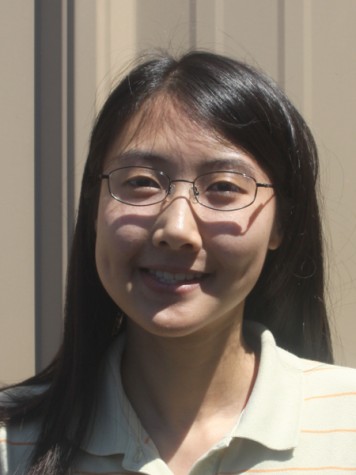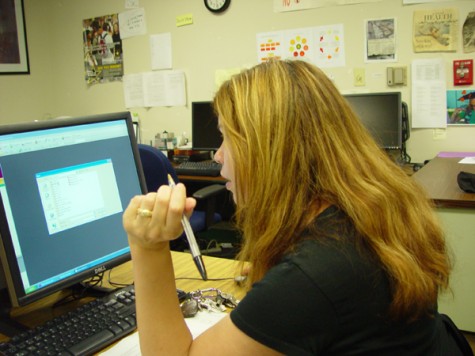The Math and Science Transfer Excellence and Retention Scholarship Program, which was funded by a $500,000 grant from the National Science Foundation for Glendale Community College students in science, technology, engineering, and math, will end in June 2011 after five years.
The MASTER program was created by Sid Kolpas, professor of mathematics at GCC and principal investigator of the program. Although it began in September 2006, the first year (2006 to 2007) was considered a planning year.
Kolpas and Jean Lecuyer, co-principal investigator of the program and professor of physics at GCC, spent hours writing the proposal to the National Science Foundation. “It was a long, arduous process,” Kolpas said. “They are very prestigious, and they are hard to get.”
Students who applied had to wait a semester before they could enter the program the following semester. Those who were not accepted in the fall could enter in the spring. “There has always been a waiting list,” Kolpas said. “This semester there are 40 people. It varies.”
Selin Shirvanian, a third year biology major and one of Kolpas’s mentees, said, “There were many people waiting to be admitted into the program, so I had to wait for a year to get into the program.”
Despite the long wait time, Kolpas said that approximately 200 students have entered MASTER. Currently, there are 56 students continuing from the fall semester. The maximum is 70 students.
Danny Diaz, a second year chemistry major, heard about the program from instructor of mathematics Thomas Voden. “I asked him about scholarships in the [math] field and he told me about the MASTER program.” Diaz was also “in need of assistance like books and supplies.”
Every student who is accepted into the program receives financial aid. “Most of the money goes to students’ scholarships,” Kolpas said. “But the typical student gets $750 a semester or $1,500 a year, which should cover tuition at Glendale College and books, with some to spare.”
To be accepted into the program, students must pass several requirements. They need a 2.5 grade point average or better and a math placement in intermediate algebra or higher. They also need to be a U.S. citizen or permanent resident since they have to apply for the Free Application for Federal Student Aid. Some students who do not need financial assistance still join because of the benefits.
One of the rules of the NSF is that scholarship recipients must be a science, engineering or mathematics major. Examples include biology, chemistry, chemical engineering and geology.
The students are not required to finish their courses within a set length of time. “There is not a two year limit especially in this economy when there are not a lot of classes,” Kolpas said.
After being accepted into the program, students can attend a one month summer bridge program held on the GCC campus where they receive a TI-84+ calculator. From 9 a.m. to 4 p.m., students review pre-calculus and beginning calculus. The classes are four days a week and the fifth day is a field trip to museums such as the Getty.
The benefits of joining the program increases from there. Students receive priority registration for classes. They are also guaranteed assistance with transfer fee applications and assigned to a counselor who helps with transfer goals and a student education plan.
Kevin Meza, a MASTER counselor who is also the transfer center coordinator at GCC, said that many students were already exposed to transfer strategies from “workshops, presentations and the summer bridge program.” Meeting one-on-one allows the counselors to “expand on their knowledge.”
“By being in this program, students make themselves competitive to the schools that they want to transfer to,” Meza said.
Another benefit of the program is the personalized attention from Kolpas and the mentors. Kolpas sends an electronic newsletter to students each week talking about the scholarship.
“He continually sends us informative e-mails about volunteering, internships, scholarship opportunities and words of wisdom, which includes inspirational sayings and advice,” Shirvanian said. “He is a source of information that you can always rely on.”
“I am sort of their father. The father to everyone,” said Kolpas. “I monitor their grades and how they are doing and try to get them help.”
There are approximately 41 mentors including Kolpas. Most are faculty but some are staff, administrative assistants or managers. In the past, administration has mentored.
“They are volunteering. They are not getting any money or credit for this. If I didn’t have their help, then it would not have happened,” Kolpas said.
The students spend at least 15 minutes or more with their assigned mentors each week to talk about school and other subjects.
“I mentor five students. More typically, the faculty takes on one to two students,” Kolpas said. They are like “a father or mother away from home [who] help and advise them.”
One of Kolpas’s mentees is Karina Estrada, a third year who is majoring in civil engineering.
Estrada said she could talk about school related or personal issues with Kolpas. “It was a way to relieve a little bit of stress. We’ve grown close. It’s almost like we are each other’s therapist.”
Other benefits include books about NSF internships such as “A Guide to Research, Pre-health, Professional, and Post-Baccalaureate Enrichment Programs.”
MASTER students have applied to many prestigious internships or jobs. Kolpas said students have applied at NASA, Jet Propulsion Lab, Oak Crest Institute of Science, University of Michigan and Howard University in Washington D.C.
To remain in the program, students must maintain a grade point average of 2.5 or better. They must also enroll in 12 units or more every semester. Nine of the units must be transferable. Finally, they must have progress in their science and math courses.
Additionally, the scholarship partially funds GCC’s Supplemental Instruction program by adding more supplemental instructors for math and science.
The Huntington Library, the Getty, Staples, PPG Industries and Norris Foundation have all contributed in some way to the program by providing supplies, flash drives and gifts to the students.
“For a while Texas Instruments provided lightly used calculators for free,” Kolpas said. “But in the last three years, part of the NSF funds paid for them. Texas Instruments provided free software for math and science for the students one year.”
The grant also brings speakers in math and science and funds field trips to other universities and a banquet for the students.
“GCC is helping to support it too by giving me release time and donating time from faculty and staff, or donating printing for advertisements, or rooms to use,” Kolpas said.
Kolpas said that running the program is “high maintenance” and is grateful to dozens of faculty and staff who have helped him.
“One person cannot do this,” Kolpas said. “Think of me as a conductor. But a conductor is not good without the instruments. It can’t work without everyone else.”
Kolpas’s goal was to encourage more students in the science, engineering and math fields. He also wanted them to complete their transfer, get a bachelor’s degree and become a professional.
“It seems to be very successful both anecdotally and statistically,” he said.
Past students have sent Facebook messages and e-mails to the program announcing their success and thanking Kolpas, the counselors and the staff for their support.
Kolpas and another colleague at California State University, Northridge previously created the Alliance Minority Program, which lasted 12 years.
“We had students who transferred from the AMP scholarship, which ended [in] 2007, to the MASTER scholarship,” Kolpas said. “In a sense, the MASTER is a continuation and modification of the AMP NSF grant.”
Although the NSF grant was not renewed for 2011 – 2012, the future of the MASTER program is yet to be determined.
“The program ends completely in June,” Kolpas said. “If I weren’t leaving, I would have reapplied and not changed it. A couple of faculty modified the proposal a little and it was rejected.”
Meza said, “Sid put a lot of time and effort into it. It would be hard to replicate it, but we should try.”
Voden, who was part of the faculty who tried to renew the grant, said, “[The program] took a long time to build and it would be sad to see it just disappear.”
Even though Kolpas retired last year, he is teaching Math 145 while running the program and the science lecture series. “I’m moving [to the] Philadelphia [area] to be near my daughters. My older daughter gave birth to twin boys, and now I am a new grandfather.”
He added that he was sad to leave. “I will miss Glendale College. It will be hard to say goodbye to my friends and students.”
Many aspects of the MASTER program will be missed. Karo Karagezyan, a third year chemistry major, said, “[The program] has helped me a lot because when you are meeting with your mentor and you have a question about something you had in class, you can ask them. And they are more than qualified to answer about the subject.”
Greg Perkins, another MASTER counselor and EOPS counselor at GCC, said he will miss the “closely knit learning community of students. It’s very exciting to see the energy that those students share as part of the program.”
Diaz said he will miss “Dr. Kolpas, my tutors and the scholarship experience.”
“Having the scholarship relieves me of having to worry about paying for books and allows me to focus on school more,” he said.
“I am sad that the program is ending, but there’s nothing I can do about it. It’s out of my control. What I can do about it is just continue my school work and do what I have to do to be able to transfer next year.”


